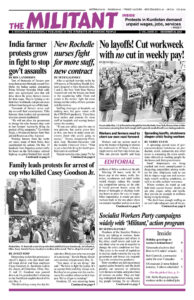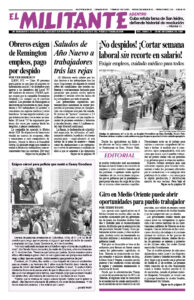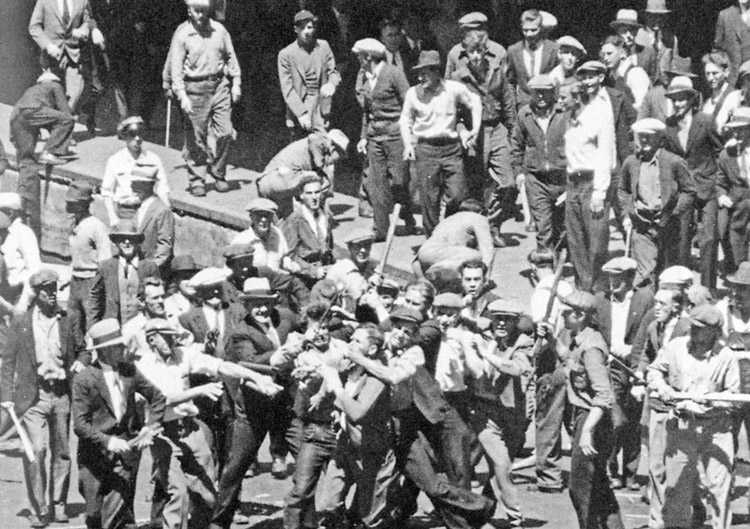Teamster Bureaucracy, by Farrell Dobbs, is one of Pathfinder’s Books of the Month for December. It is the last in a four-volume series on how a class-struggle union was forged in Minneapolis and across the Midwest trucking industry in the 1930s. Dobbs, a central leader of these battles, was national secretary of the Socialist Workers Party from 1953 to 1972. The book also tells how Teamsters and SWP leaders were railroaded to prison for helping lead labor opposition to the U.S. rulers’ drive to enter World War II. The excerpt is from the Afterword. Copyright © 2018 by Pathfinder Press. Reprinted by permission.
The relevant elements of the class-struggle program needed by the trade unions should be introduced realistically on a transitional basis. In that way the unfolding labor radicalization can be guided from its present stage toward higher forms of development along the following lines:
Proposals for immediate action should center on problems involving the workers’ urgent material needs and the defense of their democratic rights. It is also important that the fight around those issues be attuned to the existing levels of consciousness in the union membership. Then, as significant forces are set into motion through that approach, several things take place. Rank-and-file militancy rises. Increasingly sharp clashes with the bosses result, during which the workers begin to shed class-collaborationist illusions and acquire class-struggle concepts. Lessons thus learned during industrial conflicts can prepare the union ranks for an advance toward action on a political plane. In short, a foundation is laid from which to initiate transformation of the trade unions themselves into instruments capable of developing far-reaching revolutionary perspectives.
As the transitional process from where they are to where they should be continues, the workers’ attention can be focused on broad questions which go far beyond day-to-day issues on the job. They will learn in that way to generalize their thinking in class terms, and the development of a conscious anticapitalist outlook will follow.
If, during the course of their experiences in struggle, the labor militants are helped to analyze the causes of the social and economic ills facing them; if they are aided in perceiving the essence of an outlived capitalism — they will learn that the existing problems are not incidental and episodic at all, but the consequence of a deep structural crisis of the system. They will then see why governmental control must be taken away from the capitalists by labor and its allies.
Basic to such a rise in the workers’ class consciousness is understanding that a fundamental change must take place in the role of the trade unions, which constitute the existing form of mass organization among the workers in this country. These broad instruments of struggle must be turned away from reliance upon so-called friends among the capitalist politicians. They must break off the self-defeating collaboration with the bosses’ government, that has been imposed by bureaucratic misleaders. The unions must be transformed into mechanisms for independent and militant action by the workers all along the line. Restrictions on the right to strike must be vigorously opposed and freedom to exercise that right firmly asserted. Internal union democracy must be established so that all questions can be decided on the basis of majority rule. Then, and only then, will organized labor manage to bring its full weight to bear in confrontations with the employers at the industrial level.
Whenever conflicts of significant magnitude erupt within industry today, the government intervenes on the employers’ side; and this interference is bound to intensify as capitalist decay gets worse. From this it follows that trade union action alone will prove less and less capable of resolving the workers’ problems, even on a limited basis. Objectively, industrial conflicts will assume more and more a political character, and even the most powerfully organized workers will be faced with an increasingly urgent need to act on the new and higher plane of politics.
Therefore, efforts to build an effective left wing in the trade unions will run into insurmountable obstacles unless the workers move toward resolving the problem of political action. A vigorous campaign must be conducted to break the labor movement from subordination to capitalist politics and to launch an independent labor political organization. This campaign will have to focus initially on educational propaganda for a change in labor’s political course, but it should not be conducted in an abstract, routine manner. Ample opportunity will be found to concretize the propaganda by drawing the lessons of setbacks caused by the misuse of labor’s inherent political strength. …
In the process of creating their own mass party, based upon and controlled by the trade unions, the organized workers can draw unorganized, unemployed, and undocumented sections of their class into a broad political alliance. Labor will then be in a position to act both in a more unified manner and through advanced forms of struggle.
The workers will learn to generalize their needs, as a class, and to address their demands on a political basis to the capitalists, as a class. …
As Leon Trotsky insisted in discussions during the 1930s, the American workers must learn to act politically and to think socially if they are to attain the class consciousness and solidarity needed to defeat the exploiters. …
At every juncture in the unfolding social conflicts, the workers and their allies need guidance from a revolutionary socialist party. That is the reason for the existence of the Socialist Workers Party. Its scientific analysis of the class struggle provides in fullest measure the political consciousness and program that the anticapitalist movement must have. Therefore, it is uniquely qualified to shape the basic proposals, broad strategy, and tactical steps required for the most effective mass action. …
As the Teamster story demonstrates, the principal lesson for labor militants to derive from the Minneapolis experience is not that, under an adverse relationship of forces, the workers can be overcome; but that, with proper leadership, they can overcome.


